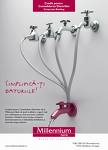Boston commercial and personal injury trial Lawyer, the attorney, takes a look at Caribbean based Millenium Bank, the latest banking Ponzi Scheme to have bilked U.S. and other investors seeking big returns on their investment monies.
On March 27, 2009, St. Vincent and the Grenadines (SVG), by its International Financial Service Authority (IFSA), appointed KPMG-International to assume control over the affairs of Millennium Bank (“Millennium”) in order “to preserve records and assets”. The IFSA was acting on information obtained from the U.S. Securities and Exchange Commission (SEC), after the SEC had issued a civil complaint against Millennium Bank, a number of affiliates and individual participants, including William J. Wise, Kristi Hoegel and Jackie Hoegel.

This, however, was not the first time that the IFSA had taken action gainst Millennium. In fact, in 2004, the IFSA had legally moved to revoke Millennium’s license, a decision the SVG government later reversed, allegedly after the prime minister of SVA intervened on its behalf. Court documents indicate that William Wise, representing himself as a duly licensed Canadian legal counsel appealed the suspension, and ultimately prevailed.
This is when things ostensibly turned for the better for the once fledgling offshore bank. Undertaking an aggressive international marketing campaign led by Wise, deposits grew dramatically based on the promise of high interest CDs, rates which no U.S. bank could even come close to matching. It appears that the plan was successful as deposits grew in dramatic fashion.
Unfortunately for investors, who believed they were buying legitimate certificate of deposits in exchange for their cash, it appears that the bulk of the funds were being diverted to accounts held by Wise, principally at Washington Mutual Bank in Las Vegas, Nevada, and used for the personal needs and extravagances of these individuals.
Had the SVG followed through with its intended plan, which was to wind up the affairs of the bank, defrauded investors may have been spared the painful and unfortunate insolvency and the tragic ending that now appears inevitable. A review of records from the 2004 insolvency proceeding are instructive.
According to the report of the controller, who took control of the Millennium in October, 2003, the bank had a deficit of $4.2 Million as of July 3, 2003, against share capital of $2.1 Million. By January 31, 2004, the accumulated deficit had increased to $4.8 Million, liabilities totalled $4,428,673, while customer deposits were only $3,774,463. This was in violation of the SVG’s International Banks Act of 1996, which stated that “No class one offshore Banking license shall be granted to or maintained by any company unless it has and maintains fully paid-up capital of not less than $1 Million.”
Based on records inspected by the SVG appointed Controller, Millennium incurred significant losses from the date of its incorporation, resulting in large accumulated deficits. The 2001-2003 annual financial statements provide the following information:
Audited Audited Un-Audited
2001 2002 2003
Net losses (719,743) (1,276,448) (2,262,678)
Accumulated Deficit (719,743) (1,996,191) (4,258,869)
As a result of his the controller filed a report, recommending that the Millennium’s operations should cease. He relied on the following findings:
• The business of the bank was carried on with reckless disregard of the insufficiency
of the Bank’s assets to satisfy its debts and liabilities, specifically to its depositors
• The Bank from inception never instituted effective revenue earning strategies.
• There was no investment strategy in place from inception, Moreover, deposits, which were used to finance the banks operations appeared to have benefited one man, William J Wise.
• The financial statements from 2001-2003 reflected a continuous loss in each year of operation, making the bank’s ability to continue dependent upon financing from its shareholders.
• A significant amount of capital injection was necessary ($4 Million) to revitalize the bank, but that William Wise appeared unwilling or unable to procure the necessary funds.
It thus appears that Millennium was a small, fledgling banking entity when the IFSA unsuccessfully sought to close it down. While the modus operandi of William Wise seemed clear then, and is obvious now, there was insufficient impetus to halt his fraudulent practices. Five years later, the bank is closed for good, but a paltry $3 million in investor losses at the time, now appears to have hemorrhaged to over $100 millio
If you are a Millenium Bank victim, the Law Offices of the attorney, and its affiliates, is prepared to review your situation and potential claim(s) without charge, and will consider representing you on a contingent fee basis, which means that you will not have to pay out of pocket for your legal representation. The firm will take a fee only if we are successful in recovering your assets.
, .
 Boston Accident and Injury Lawyer
Boston Accident and Injury Lawyer

